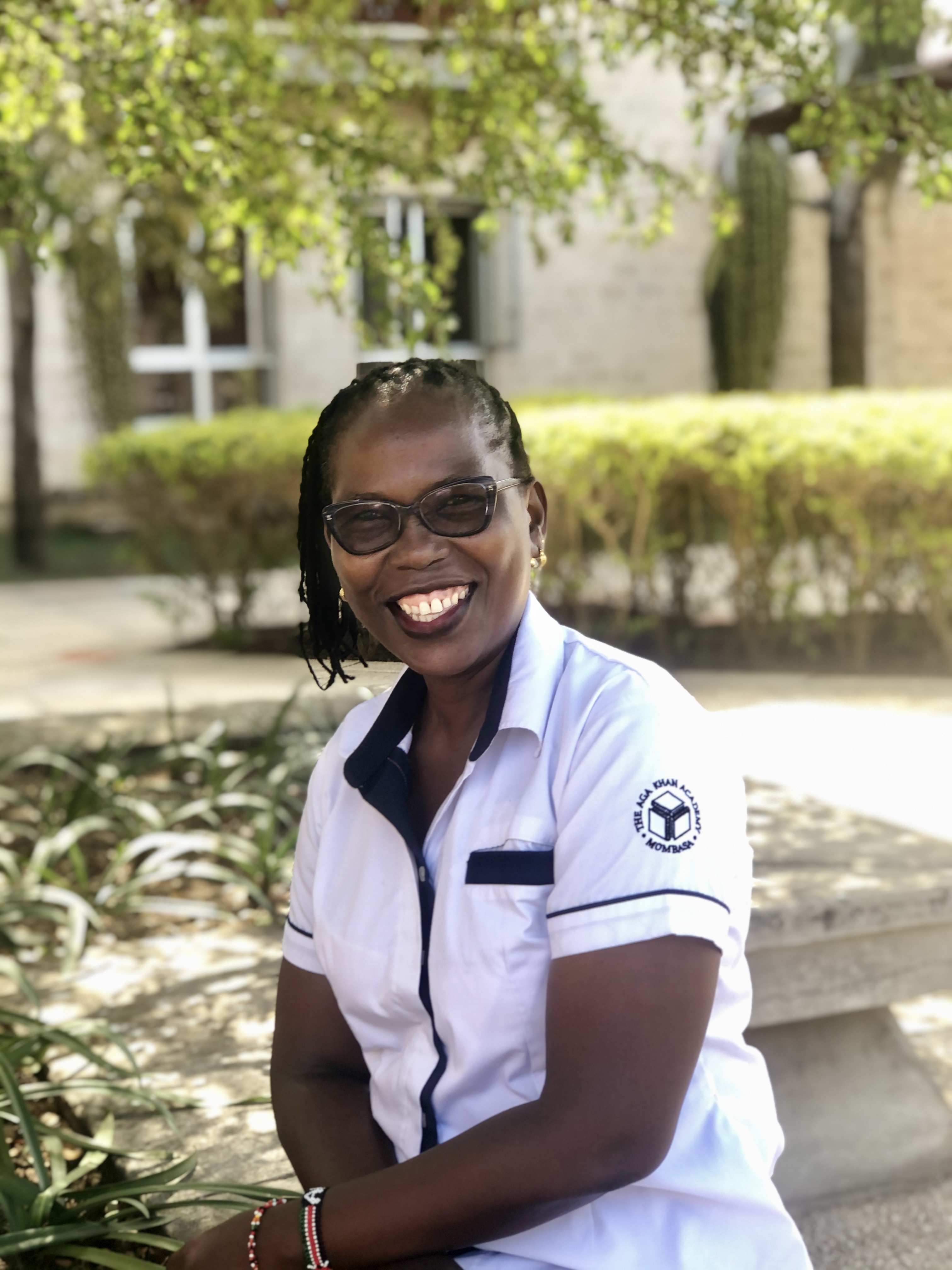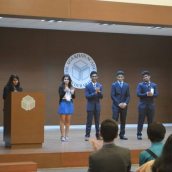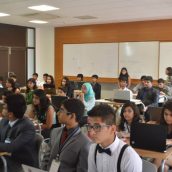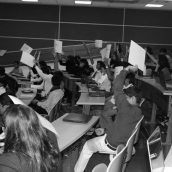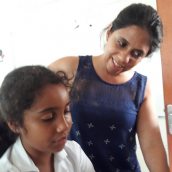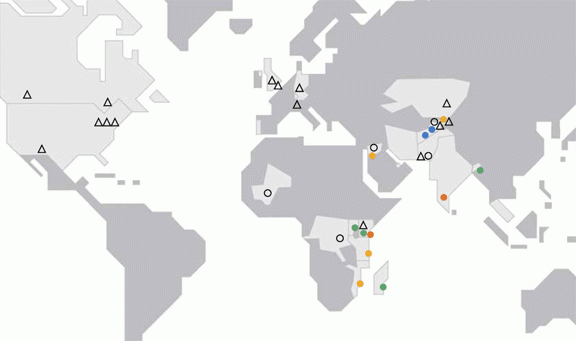
The Academies Network
The Aga Khan Academy Dhaka is the fourth of a planned network of Aga Khan Academies being established in countries across Africa, South and Central Asia, and the Middle East.
The aim of the Academies is to develop future leaders with the skills and knowledge to support positive development in their societies. We achieve this by recruiting exceptional young people from all backgrounds and providing them with the highest international standard of education.
Selection is means-blind and competitive, based on student merit. Students of all backgrounds who satisfy the requirements for entry are encouraged to apply.
When complete, the network of Academies will form a global learning community of approximately 18 schools in 14 countries (map). They will eventually serve approximately 14,000 girls and boys of exceptional calibre, graduating 1,500 students annually.
For more information, visit our Academies network home page.

The Academies Network
The Aga Khan Academy Mombasa is the first of a planned network of Aga Khan Academies being established in countries across Africa, South and Central Asia, and the Middle East.
The aim of the Academies is to develop future leaders with the skills and knowledge to support positive development in their societies. We achieve this by recruiting exceptional young people from all backgrounds and providing them with the highest international standard of education.
Admission is means-blind and based on merit to ensure access for eligible students regardless of financial circumstances.
When complete, the network of Academies will form a global learning community of approximately 18 schools in 14 countries (map). They will eventually serve approximately 14,000 girls and boys of exceptional calibre, graduating 1,500 students annually.
For more information, visit our Academies network home page.
Milka Gatungoh: The dedicated school nurse
When Milka Gatungoh joined the Aga Khan Academy Mombasa in 2010 as the residential school nurse, she knew her experience was going to be exciting and fulfilling. Her main role has been to address the physical, mental, emotional and social health needs of all school members, especially of students, to ensure their success in the learning process.
In the 10 years she’s been with the Academy, Milka’s favourite parts about the school is the pluralistic community, its culture of giving back to others in society, as well as the positive work environment that enables one to grow professionally.
“The cultural diversity and involvement in community service, which provides us with the opportunity to help others in a very special way, are my favourite things about the Academy,” Milka said. “There is also a lot of potential for one to nurture their career if they know what they want to achieve in life.”
As a little girl, Milka never liked to see anyone in any kind of pain so she always made sure to reach out to help. As the residential school nurse, she continues to be compassionate and empathetic when caring for students because she feels it makes a huge difference to understand what they’re going through in order to offer the necessary support.
“I always have to engage with students emotionally because sometimes their physical pains are caused by emotional distress, also known as psychosomatic illnesses," Milka stated. "Offering emotional support is sometimes the only remedy they need and not necessarily painkillers."
At the onset of the coronavirus pandemic, Milka said her role changed drastically, which has been rather challenging, but has gotten better with time. Being on the frontline, she has had to work extra hard to educate people on the virus, demystify the myths, fight any stigma and ensure all necessary protocols are followed for the safety of all school members.
“I have had to emphasise on the importance of people observing the World Health Organization safety measures regarding the virus, which was a little difficult initially as the reality of COVID-19 had not hit most of the students and staff,” Milka said. “As a caregiver on active duty, I also faced a little stigma because people thought of me as a risk factor for contracting the virus. Additionally, I’ve had some people express concern about visiting the health and wellness centre at the Academy for fear of being subjected to a COVID-19 test, especially when they have cold symptoms. Despite all these challenges, I’m glad I have been able to offer support and care.”
To further help spread positivity during the pandemic, Milka has been providing psychosocial support for students through virtual seminars by encouraging them to develop a caring attitude and helping them cope with any fear or anxiety they may have.
For Milka, the most rewarding part of her job is seeing the students she nurtures live healthy lives and succeed in their school life. As she continues to do what she loves the most, which is being of service to others, Milka said the fulfillment of her purpose in life is guided by a set of first aid goals, which are, to preserve life, prevent further injury and promote recovery.
“Whenever I’m attending to anyone, I am keen to ensure that I stick to these goals, which have become my motto in life,” Milka said.
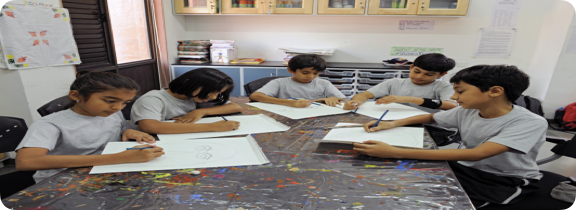
Fee Schedule
Fee schedule for the 2024-2025 academic year.
Click here to download the AKA Dhaka fee schedule for the 2024-2025 academic year.

* Residential facilities will not be available in 2024-2025.
Fees Policy
1) All students are required to pay the Academy fees on a timely basis.
2) On first joining, students must pay the admission fees (non-refundable), tuition fee and caution money deposit (refundable) in advance, prior to attending the Academy, by the designated date.
3) Students are required to pay tuition and transport fees (if eligible) based on the invoice issued through BEFTN or direct deposit at the bank.
4) School bus transport cancellation must be given 2 months prior to the cancellation date. Otherwise, 2 months’ transport fees will be deducted from the deposit.
5) Field trips and any other such off-campus educational experiences which are not included as part of the compulsory curriculum are charged as and when the same is conducted.
6) Exam fees for the Middle Years Programme (MYP) and Diploma Programme (DP) will be billed separately based on the actual fee charged by the International Baccalaureate (IB) and other related and incidental expenses.
7) Payments made after the due date are considered to be late.
8) Late fee payment: Fees not paid by the due date will incur a late fee penalty of 2% per month on the outstanding balance at the end of the month.
9) The Aga Khan Academy Dhaka will send two reminders to the parent, requesting full payment of all fees due (along with late fines if applicable). The parents are responsible for ensuring that the Academy has their updated and functional email address.
10) If the payment is not made within the stipulated time of the first reminder, the following actions will be taken for non-payment:
· Students shall be removed from ManageBac.
· If payment is not received in the next 7 days of the above action, the child shall not be allowed to attend classes.
· If the payment is not received in the next 7 days of the above action, the child will be de-enrolled from the Academy.
11) In the case of a student being de-enrolled or expelled, no fees will be refunded except for the caution money deposit.
12) The Academy retains the right to set off or adjust dues from the caution money deposit or any other amounts the family owes to the Academy.
13) Claims for refund of caution money deposit are to be made in writing, using the required form, within one year of the date of leaving the Academy.
14) The Academy reserves the right to withhold results, school certificates, transfer certificates, transcripts, university referrals or any other information and/or documents if fees or any other dues payable to the Academy are outstanding or not paid in the directed manner.
15) The board of directors of the Aga Khan Education Service, Bangladesh, reserves the right to change these rules anytime if necessary.
16) Student withdrawals and notices:
· The communication of withdrawal by the parent for the beginning of the next academic year must
be sent to the respective school principal's office by 3 March of the due academic year.
· If the communication is received after 31 March, the withdrawing student's full first-term
fee for the next academic year must be paid.
· If the withdrawal is to take place in the middle of the academic year, the Academy requires 90
days' written notice prior to the beginning of the next term.
· If the withdrawal application is not received 90 days before the beginning of the next term
· The communication of withdrawal by the parent for the beginning of the next academic year must be sent to the respective school principal's office by 31 March of the current academic year.
then the following charges shall apply:
(a) 60-89 days before the start of the next term, will be charged 25% of the next term's fees.
(b) 30-59 days before the start of the next term, will be charged 50% of the next term's fees.
(c) Less than 30 days before the start of the next term, will be charged 75% of the next term's fees.
(d) No refund on the next term's fee shall be given after the start of the next term.
(e) The start of the term is defined as the day on which classes begin as per the official calendar shared with the parent.
Please note that any parent making payments through the BEFTN option must send their payment receipt to finance.dhaka@agakhanacademies.org every time they make a payment; otherwise, the Academy will be unable to credit the student’s account.
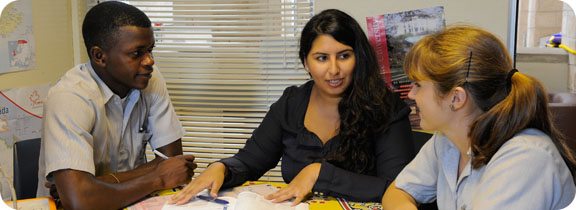
Teacher Professional Development
Promoting excellence in teaching, both on campus and more broadly, is a fundamental goal of the Aga Khan Academies. Each Academy has a Professional Development Centre (PDC), which strengthens the profession of teaching in the region by investing substantially in teachers’ professional development.
Developing strength in teaching
We identify and develop teachers of the highest quality who are committed both to the all-round development of young people and to their own professional growth as excellent teachers.
Our PDC supports excellence in teaching by promoting best practices in teaching and learning. We provide ongoing, collaborative training for Academy faculty as well as outreach programmes for teachers and head teachers from neighbouring government, private and not-for-profit schools. Our faculty members also have the opportunity to collaborate with colleagues across the globe and to teach abroad within the Aga Khan Academies network.
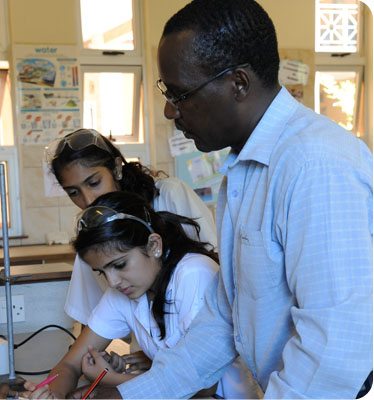 Outreach programmes
Outreach programmes
Our outreach progamming includes a course from the Professional Learning for Educators Series (PLES). The PLES programmes are designed by the Aga Khan Academies. They respond to the need to improve the standard of teaching and learning identified during extensive market research and interaction with government and departments of education.
The series includes programmes for teachers in various subject areas as well as specialised programmes focusing on skills and understandings related to education. We build professional competence by enhancing teachers’ subject knowledge and by examining how to teach that subject effectively. Each programme provides participants with a balance of intensive learning activities followed by an extended period of assisted application and observation within their own classrooms.
Strengthening curriculum and community
Through our professional development provision, we help create a professional community of competent, well-resourced teachers. These teachers will continue to support and collaborate with one another on materials development, by sharing best practices, and in establishing diverse academic, cultural and social projects.
AKAHMUN 2014 – The Future is Now
It all began on 22 August, 2014, when the Secretariat for the Aga Khan Academy, Hyderabad Model United Nations 2014 was finally announced. There was excitement in the air, as well as anxiety. We weren’t sure how we would raise the bar set last year. I was unsure of how the team would work together, how passionate they were and whether offsite management would work. I had organized the Model UN last year too, but this time, it was different. I wasn’t on campus and I didn’t know the new lot of students I was dealing with.
We began our journey with our first ever Model UN meeting. I expected the meeting to start late, for punctuality was rare to see. However, I got my first surprise, when every single member turned up not only on time, but half an hour early! That day I knew that no one would follow the timeline. Not because they’d miss the deadlines, but because their absolute dedication to AKAHMUN drove them to accomplish much more than what was required of them.
We planned out an extensive timeline of every aspect of the conference, a string of meetings and the nature of committees. Although everything looked perfect, I knew from experience that I must expect speed breakers, for if there are no problems, I know that I am surely doing something wrong.The first hurdle we encountered was in dealing with the day scholars. As part of the pre-Model UN preparation, we decided to organize trainings for the delegates. However, because this time around we had day scholars taking part too, we needed to ensure that we included them in every aspect of the conference. Arranging bus timings, coordinating with parents and taking permissions from teachers was a massive task. There were times when we wouldn’t be able to include the day scholars, when the timings wouldn’t match or when the day scholars had other programmes on schedule. However, we tried to reach out to as many as possible because it was a start, indeed. If it weren’t for my anchor, the Secretariat back on campus, it would have been impossible to organize such trainings.
The second hurdle we encountered was when we needed to finalise the committees. All the members of the Executive Board were excited about the idea of a Joint Crisis Committee (the Allied and Axis Cabinet), where the workings of one committee affect the workings of another. We had just one question in mind: would the first-time delegates be able to pull it off? The decision to go ahead with this committee was a risk, for crisis committees require a certain level of debate and experience. However, I also knew that with the Directors I had, I could trust that they would leave no stone unturned.
Logistics are by default the biggest area of concern in any conference, for it is by far the hardest job to pull off. The job entailed printing folders, placards, arranging the venue, the speakers, lights, cold drinks and much more. Last year, we didn’t have as many delegates to cater to, but this time around the number was massive. There was surely an inverse relationship between the number of days left for the conference and the number of challenges we faced. There were times when we were disheartened at a permission not going through or a delay in procurement of materials. Yet, it was the DP1 lot of the logistics team that stood strong. They travelled off campus, to far away locations, to get materials, send documents for printing and purchase eatables. I was truly surprised at the amount of effort they put in both during and after the conference. They worked during Diwali breaks and on weekends, like professionals, and never complained at having to do the most trivial tasks.Fast forward three months. It is 14 November 2014. After hours of tireless work, pushing ourselves to meet deadlines, and sleepless nights, it was D-Day. The air was filled with excitement and nervousness, as first-timers walked into committees, unaware of what to expect. And it wasn’t just the delegates, the Directors too were nervous, for most of them were taking the other side of the dais for the first time. Seeing the delegates buzzing through the committee rooms, we knew that the roller coaster ride had just begun. All we heard over the next three days were: Do we have projectors in all committees? Is the AC working? Are there enough chocolates in each committee? Where are the pens? Whether it be lunch, breakfast or dinner, we all forgot what it was to have a proper meal because our main focus was to get the delegates in committee.
All the efforts paid off when I received two unusual requests, over the three days of the conference. A member of the IT team, who had enrolled his name on the team to avoid participating in debate, came up to me and asked if he could participate in a committee. Initially, I was upset at this last minute request and so I asked him why he had made such a sudden request. What he replied then stayed with me throughout the conference. He told me that on seeing the enthusiasm amongst the delegates, he wanted to experience what it was like to be one. And so without any prior research, he sat through committee sessions and eventually won an award. This incident made me realize the potential at the Academy. It is only a matter of pushing them to apply themselves.
Another time, a 7th grader, who had entered the conference as a logistic member, came up to me and expressed his grief. On further probing, he told me that he really wanted to be a delegate, but couldn’t because he was a 7th grader. He had been so mesmerized by the whole event that he wished to take part. I smiled, with a sense of pride, at the impact of the conference. Over the next three days, the 7th grader debated issues in ECOSOC, argued with his seniors, and remained unintimidated by their age or knowledge.AKAHMUN 2014 had the power to bring about change. The JCC, which we were most skeptical about, brought out the best in delegates. The morning crisis, which initially made the students cranky, became the highlight of the three days. Students who initially didn’t openly accept the idea of a Model UN, jumped to take part. More importantly, though, I learnt, in the months leading up to the conference, the value of a great team. This team had dedication, passion and the will power, to make the impossible, possible. They were patient in low times, calm when faced with criticism and passionate about their goal. They worked day and night, at times when IB work was at its peak and applications lingering on their heads. They were truly the support system of this conference.
When I hear today how after the MUN, 7th grade students returned to their rooms, formed their own committees, elected their own Secretary General, came up with their own crisis and still use parliamentary language in daily conversation, I know that the Model UN tradition started in 2013, will continue for years to come. When I hear students asking about the next conference they can attend, I know that a spark has been ignited. When I hear that people are vying for the posts on the Secretariat next year, I know a culture has been sowed.
As we pass the baton on, we have realized the power of Model UN conference.
By Alisha Sonawalla
Nuala Alibhai: Enriching educational and social programmes at the Academy
“The Academy through the International Baccalaureate curriculum has earned a positive reputation for its pluralistic approach, providing a holistic learning environment, developing leaders and achieving educational excellence.”
Nuala Alibhai is the Learning Student Support Coordinator for junior and senior schools at the Aga Khan Academy Mombasa. In this role, she works in collaboration with the Academy’s Principals to develop on-going systems of support for the student community. This includes providing leadership, management and advice on inclusion within the school to develop a differentiated programme that both challenges and meets the needs of students. She also ensures that the Student Support Unit effectively identifies students with any needs for additional support need, including gifted and talented, as well as vulnerable students.
She was born in Kenya where she acquired her basic education. She obtained her undergraduate degree from University College London as Speech and Language Therapist. Later she pursued her Masters in Inclusive Education, at the University of the West of Scotland where she completed her research in inclusive education at the early years level.
At the Aga Khan Academy Mombasa, Nuala works on a Value-based Education Programme, as a Curriculum Designer, through the Professional Development Centre at the Academy. She came to the Academy with a diverse background in inclusive education at a school, community and public policy level. “I was keen to apply this knowledge and skills within a mainstream school setting, to enable every student to achieve and succeed in school, career and life,” she remarks.
It has been Nuala’s endeavour to improve social outcomes through strategic planning and capacity building at the local government and community level. She is also passionate about designing and developing alternative educational programmes for vulnerable children, in order to ensure that they realise their full potential, so they can succeed in life as dignified equals. She has achieved both of these objectives by working for the past 15 years as a speech and language therapist and as an educational consultant in both the private and public sectors in Kenya and the UK.
Since September of 2016, Nuala has been with the Academy and appreciates how the Academy has provided her with opportunities to develop her teacher training skills and curriculum development skills. Nuala says, “I enjoy working with teachers who bring their hands on experience in the classroom and subject relevant knowledge to the table so we can enrich the educational and social programmes at the Academy.”
When asked what led her to choose a career in teaching, Nuala replies, “Karma! I started my career as a health professional but on my return to Kenya, I was sought after to do training, policy work and change management in the education sector. As my experience and confidence in the area grew, I began specialising in education. I have always seen myself working with children, so education was also an attractive choice.”
According to Nuala, the International Baccalaureate (IB) curriculum and the Aga Khan Academy strands set the Academy apart from other educational institutions. “It is one of the few schools in Kenya that offers the IB curriculum, which I consider to be the gold standard in education because of its holistic approach, academic rigor and emphasis on community service. The strands are added dimensions that help students make better sense of themselves, others, the world around them and the interconnectedness of all these elements.”
In terms of ensuring a climate of pluralism on campus where students from different racial, ethnic and faith backgrounds work together, Nuala feels the pluralism strand is already integrated into the lessons in the classroom, extracurricular activities after school and during out of school activities. “Collaboration skills are one of the approaches to teaching and learning, so students are exposed to activities that encourage and enable them to work with others who are different from them and have different opinions than them. They are encouraged to listen to others respectfully and consider their perspectives. This builds communication skills and empathy in students. These skills are then transferred to the student’s day-to-day interactions and not only in the classroom,” she reiterates.
When asked about the most rewarding aspect of teaching at Aga Khan Academy Mombasa, she replied, “The collaborative spirit and practice amongst the staff.” She further adds that there is appreciation and inclusion of every individual’s knowledge, skill and experience in decision-making. According to Nuala, strategies and unit plans are collectively produced not only to enhance the quality of the teaching and learning experience for the student, but also to allow the adult to grow, as a professional, in the process. “The teachers on the whole are approachable, warm and a joy to work with,” she comments. Parents are also involved as much as possible in their children’s education, she mentions. Parents get regular updates from the school on their child’s progress and well-being and are given recommendations of how to extend the learning and support beyond the walls of the school, she adds.
Nuala strongly feels that her position at Aga Khan Academy Mombasa has given her the opportunity to individualise the learning for every student. “My prayer is that this opportunity helps them become more self aware, reveal their talents and inspire them to make bigger strides forward with direction and confidence.”
Hindi Milap: Senior School Art Exhibition
Hindi Milap's coverage of the Aga Khan Academy, Hyderabad's Senior School art exhibition, held on 19 March 2015 (article in Hindi).
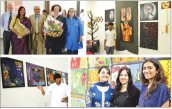
Academy Theatre Circle announces Hindi Play
Ek Raja ki Kahaani - Saturday, 21st May 2016 at 8:00 pm at Lamakaan. Tickets from https://in.bookmyshow.com/hyderabad/plays/wingless-ek-raja-ki-kahani/ET0...
Academy Welcome for 2016-17!
The Aga Khan Academy Hyderabad warmly welcomes all students, teachers and staff – new and continuing - to a fresh academic year. We look forward to greeting boarding students and families on 7th August and day students on 8th August for an exciting and enriching year ahead!
